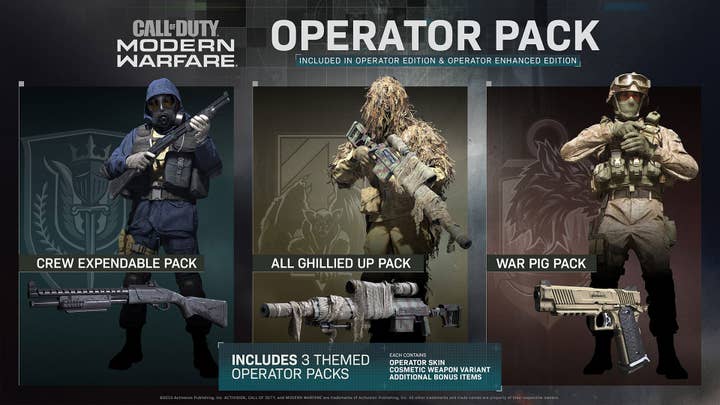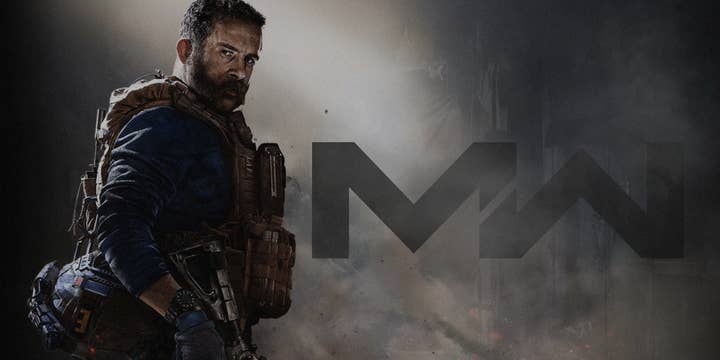Call of Duty: Modern Warfare "eliminates season pass" - so how will it fund DLC? | Opinion
Activision promises to deliver more free maps and post-launch events as it gears up for large-scale cross-play multiplayer
This year's Call of Duty will reboot the popular Modern Warfare series and also marks a change in how the best-selling franchise will monetise its players after launch.
For more than a decade, Activision has sold map packs -- released periodically throughout the year after release -- to expand the multiplayer mode. Since Black Ops II in 2012, fans have had the option of a season pass to gain access to all map packs with a single purchase.
But in the announcement for this year's entry, Infinity Ward's co-studio head and creative director Patrick Kelly said Modern Warfare will be "eliminating the traditional season pass, so that we can deliver more free maps and content as well as post-launch events to all players."
"There will almost certainly be a Call of Duty in 2020. That gives Modern Warfare one year to maximise the revenue it generates after launch"
Abandoning this model has one clear advantage: it avoids segmenting your audience as each map pack is released. Communities will no longer be separated into the haves and have-nots, maximising the pool of online opponents. This will be particularly appealing given that Modern Warfare is introducing cross-play across PC and console (although it's not currently clear whether that includes connecting Xbox One and PS4).
Incidentally, cross-play may be the reason the PlayStation exclusivity over new content is just seven days this time around, as opposed to the 30-day lead secured in the past. Again, it's about keeping the community playing together.
One question remains, however: in the absence of a season pass, how will Activision fund the ongoing development of Modern Warfare's map packs?
Other publishers have already sought their own solutions to this. Activision's main rival EA, for example, notably dropped the season pass for Star Wars Battlefront II -- largely because the audience for its 2015 predecessor had become wildly segmented as fewer players picked up that game's season pass. (It probably didn't help that the pass cost $49.99 -- almost as much as the base game)
For the 2017 sequel, EA instead turned to loot boxes to fund ongoing development -- and the fallout has been well-documented. While the proposed system, which gave players who bought the boxes a distinct advantage online, was actually scrapped, the backlash against this model is still being felt today.
There were actually loot boxes in that year's Call of Duty, the Sledgehammer-developed WWII, but this was overshadowed somewhat by the Star Wars debacle.
EA learned its lesson for Battlefield V; while last year's shooter also dropped its season pass, and actually abstained from any monetisation until months after launch, it has since introduced premium currency that players can use to purchase cosmetic customisations, elite sets and time savers such as XP boosts.

This would certainly be an option for Call of Duty as customisation has been at the heart of the series' multiplayer for more than a decade. In fact, it was the XP-centric overhaul of Modern Warfare that triggered the shift towards multiplayer progression and customisation (which, inevitably, has been monetised in the years since).
Perhaps the biggest indicator of how Modern Warfare may fund its map packs has come from the subsequent announcement of the special Operator Edition. Along with the base game and a few other extras, this includes three operator packs that include a character skin, a cosmetic weapon variant and a few bonus items.
"[Selling skins] is certainly an option for Call of Duty as customisation has been at the heart of the series' multiplayer for more than a decade"
If the term sounds familiar, it's because Ubisoft has been funding Rainbow Six: Siege with its own operators for the best part of four years. The game has maintained its popularity since launch in 2015, with plenty of in-game events and regular releases of new operators to drive both community engagement and more in-game purchases. While the currency to purchase these operators can be earned through play alone, buying the required credits accelerates the process.
Rainbow Six: Siege continues to be one of Ubisoft's most successful titles, and it's a model the publisher has attempted to recreate with medieval online battler For Honor, and likely the upcoming pirate outing Skull & Bones.
There is one notable difference between Call of Duty and these rival franchises: it remains an annual offering.
Battlefield and Battlefront have been alternating on a two-year cycle throughout this generation (although judging from the line-up for this year's E3-adjacent EA Play, the publisher is depending on expansions for Battlefield V rather than a new release in 2019). Similarly, there has not been a new Rainbow Six since 2015, and the game's ongoing popularity suggests there's no need for one.
But there will almost certainly be a Call of Duty in 2020, expected to be the next Sledgehammer game -- perhaps a sequel to WWII, named WWII 2? That gives Modern Warfare, as with every Call of Duty before it, one year to maximise the revenue it generates after launch. It could even be as little as six to nine months if hype for the next outing distracts from the current.
That alleviates the pressure to monetise over the long-term, but increases it in the short-term. If selling operators and cosmetics doesn't work, Activision will try something next year and support for Modern Warfare will drop off.
Alternatively, if a season pass-less Call of Duty still generates significant revenue, it could become a longer-tail title. Black Ops III proved to be so popular it was receiving new maps long after the following title (Infinity Ward's previous outing Infinite Warfare) was released -- as late as May 2017, in fact.
Given the popularity of the Modern Warfare sub-brand, it's entirely possible this year's entry could match or surpass this. If that's the case, Activision will no doubt find a way to continue monetising in a way that outperforms what it would have managed with a season pass.

